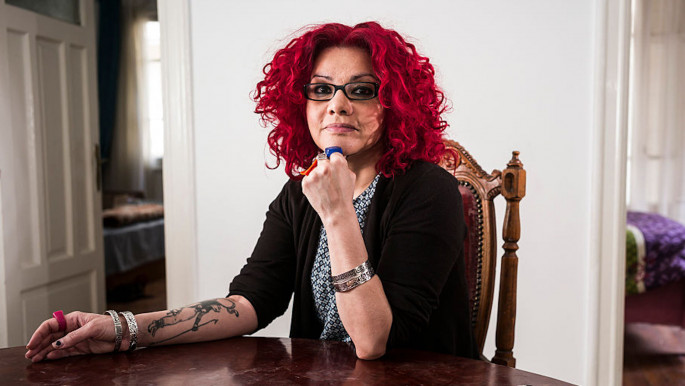As I Want: A powerful account of sexual abuse during Egypt's 2013 uprising
At the time, the assaults made international news, particularly because an American broadcaster herself was victim to one.
In turn, the incidents drew attention to the assaults and harassment endured by women in Egypt during the protests – as well as beyond them, on a regular basis.
Other elements of course garnered attention, like the public nature of the assaults, the number of men involved, and the helplessness of both bystanders and victims due to the sheer strength of the crowd and the chaos that ensued.
Featured in news footage to locate the assault in the darkness and cover of the crowd, the "red circle" became a significant reference point in the film, because it allowed the women in the film a shorthand for the public sexual assaults.
The "red circle" not only referred to the sexual assaults but also the exposure of something that was supposed to be kept secret, shameful, dark, and hidden, but was now highlighted in red on every news channel.
The red circle familiarised what was supposed to be kept secret.
Therein lies the purpose of the film – to uncover what is supposed to be kept hidden and shameful. The film is not only invested in uncovering the public assaults during the uprising, but also conceptions of womanhood, especially the filmmaker's own.
 |
Therein lies the purpose of the film – to uncover what is supposed to be kept hidden and shameful |  |
The film juggles these questions through a pastiche of street and home footage, interviews, 2013 news coverage, reenactments of the her childhood, as well as older homemade footage gathered years before her mother died.
Her mother appears as a central figure for negotiating questions of womanhood and shame, all which seem to be lie adrift, leaving us to ask not if her mother is relevant to her quest to understand her identity. But in which ways (beyond seeing her as a bearer of religious patriarchy), especially if these questions remain unfulfilled, certainly not by firm answers but at least some sort of quest in that direction.
 |
| Al Qadi's mother plays a pivotal role in the director's awakening |
Another issue that clouds the film's trajectory is the conflation of sexual assault with the election of Mohamed Morsi, a member of the Muslim Brotherhood.
Offering Morsi and the Muslim Brotherhood as Islamist spectres against which Egyptian women were rightfully protesting is reinforced by the text at the end, which refers to a law put in place to criminalise sexual harassment in Sisi's Egypt.
Suggesting that at the root of increased sexual assaults is the Muslim Brotherhood or the spectre of Islamisation in Egypt is quite difficult to believe, considering Egypt has made headlines for decades for its violence against women.
 |
To suggest that Sisi's takeover created real change is refutable with a single glance at recent media coverage of violence against women in Egypt |  |
Although violence against women has been continuous, we can look at the 1980s or 90s for similar cases that made headlines – both for public sexual assault and victim blaming (see the Maadi or al-Ataba case).
Another publicised incident of sexual violence against women occurred on May 25, 2005 (called "Black Wednesday") when men arrived in buses to grope and beat female protesters, while police stood by and watched.
The use of sexual violence as political strategy by the Mubarak regime in this case was evoked during the publicisation of assaults that took place between 2011-2014.
Certainly, the years 2011-2014 signalled a period of growth not only of harassment and assault, but of media coverage, as well. But, incidents of assault and harassment at this time only reflected a continuation of issues that preceded the newly elected Morsi government.
To suggest that Sisi's takeover created real change is refutable with a single glance at recent media coverage of violence against women in Egypt. In fact, any recent survey of the most dangerous countries and cities for women includes Egypt and Cairo in the top 10.
Despite all this, there were many compelling parts of the film, especially Alqadi's own footage through Egyptian streets where she faces sexual harassment – the affective power of these scenes lie not only in the outrage they inspire, but in the indignation of the aftermath – that is, the masculine silencing that appears to follow such an incident.
After Alqadi resists and loudly accuses her harasser, there is pushback from strangers in crowds who not only urge her to be quiet but threaten her with violence if she continues.
 |
| Read also: Why Egypt needs a feminist revolution (Mona ElThahawy) |
The response to her resistance to harassment not only evokes the social silence to which all women and potential victims are urged to ascribe, especially in Egypt where women's voices about violence have the potential to threaten Egypt's image as a whole.
But it also evokes the potential of this film in uncovering the threats against women in Egypt – that is, if we rightly think of the film as another response (like Alqadi's) to harassment on the street, then it is easy to imagine how such a film could provoke the ire and disdain of those who would rather keep it hidden and shameful, like the pushback women receive when resisting harassment: to discount it as a reflection of a unique rather ubiquitous phenomena, to shout "not all men," to treat it as a threat to a national and cultural image, to silence it rather than address those who commit the violence.
It's time to resist that deflection as both bystanders and audiences.
Nahrain Al-Mousawi is a writer currently based in Morocco
Follow her here:@NahrainAM





 Follow the Middle East's top stories in English at The New Arab on Google News
Follow the Middle East's top stories in English at The New Arab on Google News


